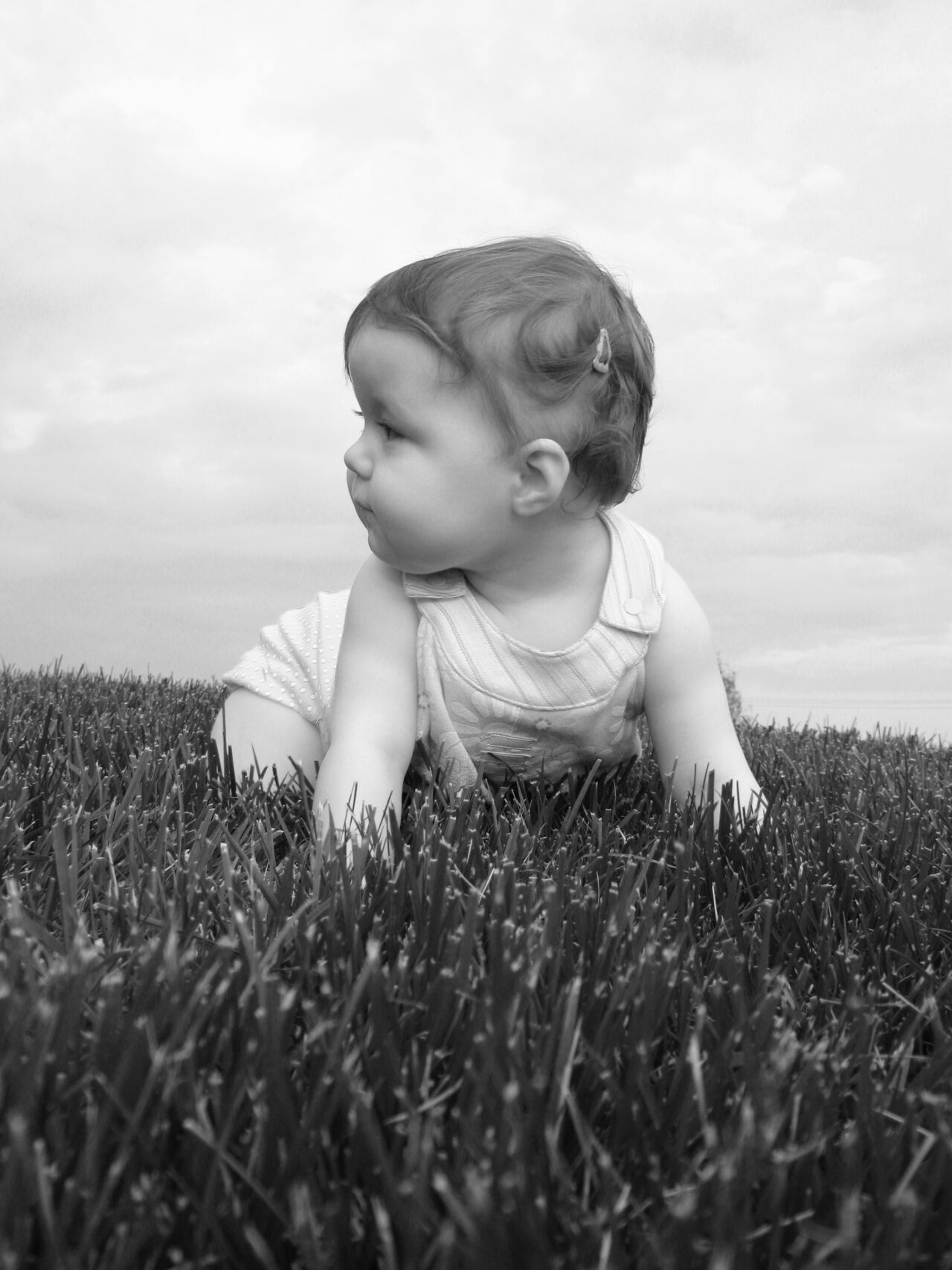
Our babies are real geniuses!
 Read this article published in Infobébés and Infocrèche magazines.
Read this article published in Infobébés and Infocrèche magazines.
Gone are the days when babies were regarded as mere « digestive tracts »! Research into baby psychology is making great strides, revealing more and more of the baby’s incredible capacities. Here’s a look back at 10 experiments that have shed light on the mysteries of this enigmatic little creature…
- Can your baby distinguish between sad and happy music?
We know that Baby is sensitive to music. But can he, like us, tell the difference between the sadness of Jacques Brel’s « Ne me quitte pas » and the joy of « Hit the road jack »? To find out, a psychologist has set up a rather ingenious experiment… She places two faces in front of eight-month-old babies: a sad one and a happy one, while alternately playing two types of music: one sad, the other happy. The psychologist then observes how long each baby spends looking at this or that photo, depending on the music being played… And then, surprise! The babies looked longer at the happy face when the music was upbeat than when the music was downbeat. Eight-month-old babies do seem to know the difference between the two moods. Bingo! So a word of advice: when you’re in the presence of your loulou, opt for happy music rather than Céline Dion’s latest languorous hit!
- Does baby prefer Penelope Cruz’s face to that of Uncle Fester from The Adams Family?
To find out, a psychologist shows a series of pairs of photos to newborn babies just a few hours old, each featuring a photo of a woman who is either very beautiful or very plain (depending on the opinion of a group of adults). The result: these little morsels of man preferred to look at the face of the beautiful woman rather than the other face, because the beautiful face would be closer to the prototype of the human face! What’s astonishing is that this innate sensitivity to the beauty of faces transcends borders. For example, if you show a Chinese man the faces of two Europeans, the one he chooses as the most beautiful is also the one chosen by the European! But rest assured, for your little one, his mom’s face will always be the most beautiful face in the world. That’s right! The law of the heart far outweighs the law of « beauty », and so much the better!
- Is your little one a polyglot?
In every language, there are linguistic contrasts that are difficult to perceive. For example, the Hindi language has a Da and a da that we Europeans can’t distinguish. What about Baby? To find out, a psychologist brings together European and Indian adults and babies and plays them a sequence of European (Ba Da) and Indian (Da da) sounds. European adults can easily tell the difference between Ba and Da, but not between Da and da. European babies can distinguish between Ba and Da like adults, and Da and da like their little Indian friends! Beware: Baby’s linguistic sensitivity seems to disappear around the age of ten months! Like us, he’ll become incapable of discriminating these subtle contrasts. Now you know why it’s so hard for us to learn a second language as we get older, whereas our little darlings manage it so easily!
- Can your five-month-old baby count to three?
Surprisingly, the answer is « yes »! But how did psychologists come to this conclusion? Like this: a psychologist forms two groups of five-month-old babies, giving them either two objects (group a) or three objects (group b) to hold in their right hand. The psychologist then shows the babies scenes containing either two or three objects. Here’s the result: babies who had handled three objects were surprised to see only two on the screen, while babies who had handled only two objects were surprised to see three! Your five-month-old can tell the difference between 2 and 3. Not only can he memorize the number of objects he has handled, but he can also recognize this « number » in a picture. So don’t be surprised if Chloé asks for her third compote if you’ve got into the habit of giving her three!
- A t what age does your loulou recognize his first name?
To find out, a psychologist makes a 4/5-month-old baby listen to his first name, lost among a string of other names. The child is placed in a booth, with a light on each side and a loudspeaker underneath. Each time a name is read out (either by the right or left speaker), the researcher records the time during which the baby looks at the light above the speaker broadcasting the voice. The result is clear: the baby listens more to his first name than to other names! At around four and a half months, baby can tell the difference between Stéphane, his first name, and Claude-Henry, his older cousin’s name. But be careful! This doesn’t necessarily mean he knows it’s his « first name ». It’s just that, as this sound is particularly familiar to him, he’s more likely to turn his head when you say it!
- Does your baby remember the stories you read to him before he was born?
Which of you has never been tempted to read a story to your tummy? But once they’ve left their cosy little nest, will your little one remember them? To find out, a psychologist asked a pregnant woman to read a short story twice a day during the last month of pregnancy. A few days after birth, the child listens to a series of stories (including this famous one), is given a pacifier and his sucking rhythm is observed. We know that the more the story arouses Baby’s interest, the harder he’ll suck. The result: the child’s sucking rhythm increases as he listens to the familiar story. Baby will remember the story! Are you pregnant? Don’t hesitate to read stories to your belly! From its cocoon, Baby listens to you and remembers all those lovely stories you read to it… So it’s up to you!
- Do you think you’ll be able to recognize your baby just a few hours after birth?
What mother hasn’t worried that her newborn baby might be accidentally swapped with another? If this is your case, this little story will undoubtedly reassure you… The principle is simple: a psychologist blindfolds young mothers and presents them each with a row of three newborn babies (including their own). Then he invites them to touch the back of each child’s hand, and to specify which of the three is their baby. The results are astonishing! 8 out of 10 mothers can identify their own child, even though they’ve only been in contact for a few hours. Why not take the test yourself, over an evening out with friends? Blindfold yourself and play at recognizing your little ones just by their smell or the softness of their skin!
- You ate a lot of hazelnuts during your pregnancy. Will your child have a weakness for hazelnuts?
A psychologist asks women at the end of pregnancy to take part in a rather original experiment… He forms two groups: mothers who, during the end of pregnancy and breastfeeding, drink only carrot juice (group a) or only water (group b). A few weeks later, the psychologist tested the babies’ tastes: he asked the mothers to feed their babies cereals mixed with either carrot juice or water, and observed their reaction… The verdict: babies exposed to the taste of carrot preferred carrot cereals more than other babies (they made fewer faces and ingested more cereal). If you’re pregnant or breast-feeding, don’t hesitate to eat your favorite flavor regularly. It’ll be one more little pleasure you’ll share with your child when he or she grows up!
- What attracts your baby more, your voice or your face?
To find out, a psychologist places a twelve-month-old baby at the other end of a Plexiglas-covered pit, a device that creates an impression of emptiness. Baby’s objective? To reach his mother and cross the pit. Psychologists have observed that babies cross the pit twice as fast when they hear their mother’s voice than when they see her smile. Contrary to popular belief, your precious voice attracts your baby more than your face. But there’s nothing like the perfect pairing: your voice and your best smile! Keep this little experiment in mind when you want your little darling, with the help of his four little limbs, to join you at the other end of the room!
- A t what age does your little one understand that « Mommy » is you and not her first cousin?
Mommy, daddy, those are familiar words to your baby! Ever since he was born, he’s been hearing them all the time. But at what age will this little fellow really be able to associate these words with their meaning? To answer this question, a psychologist placed a six-month-old baby in front of two screens: the screen on the left showed images of his mom, while the screen on the right showed images of his dad. Then a neutral voice says « Daddy » or « Mommy ». Psychologists have found that babies look longer at the named parent than at the unnamed one. By six months, your little one knows who is his « mommy » and who is his « daddy ». What’s more, there’s no confusion for him: other children’s parents aren’t moms or dads!
As you can imagine, these four kilos of love, gurgling and babbling never cease to amaze us with their astonishing abilities. They’re real little creatures that nature has equipped to flourish in our world. So let’s not underestimate them, and… beware of preconceived ideas!
| Sources and authors: Badenoch, Beauchamp, Bronner, Brown, Butterworth, Ciccotti, De Casper, Eidelman, Féron, Gentaz, Jagnow, Jusczyk, Kaitz, Lalonde, Lapidot, Mandel, Mennella, Nawrot, Parsons, Pisoni, Samuels, Slater, Spence, Streri, Striano, Tincoff, Vaish, Von Der Schulenburg, Werker. |
